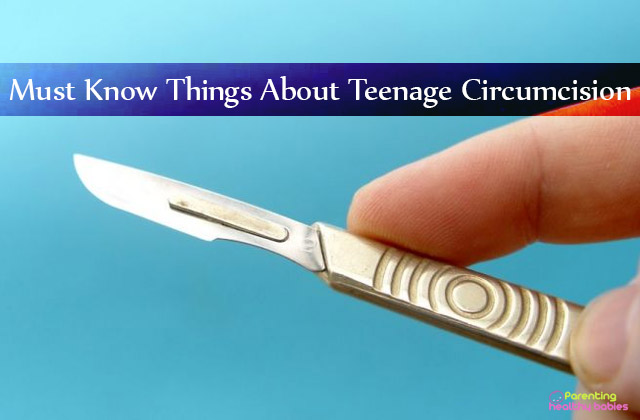Teenage is the gateway between childhood and adulthood. Children start becoming sexually mature. This age group between 13-19 years is known as adolescence or teenage. Children undergo lots of physiological, hormonal and anatomical changes. At this age, as a parent it is very necessary that you teach them and guide them to adulthood. You should talk to them freely about the changes that will occur in their body, what are those changes and why are those happening. Right information from a trusted source will prevent them from taking any wrong and rash decisions.
Guide for Teenage Circumcision
What is circumcision?
There is a flap of skin covering the rounded tip of penis and safeguarding it, known as foreskin. The skin comprises of nerve endings, blood vessels and small amount of muscles. Circumcision is a surgical procedure, where this skin is removed exposing the glans penis. This procedure has various advantages as well as some complications.
Why is it done?
It is studied that circumcision reduces the risks of sexually transmitted diseases like gonorrhoea, syphilis, herpes, hepatitis and human immune deficiency virus. It also prevents many urinary tract infections by avoiding the bacterial build up. But as every other surgery it has its own risks like bleeding, pain, psychological trauma and sexual dissatisfaction. Conditions in which it is done are-
- Recurrent infections– if your child suffers from recurrent urinary tract infections, skin lesions or skin irritation then doctor may suggest circumcision since the infection and bacterial build up under the skin is difficult to clean up.
- Adherent foreskin– normally foreskin starts coming off from childhood. Till puberty majority of the glans penis can be uncovered. If until puberty the skin doesn’t retract than circumcision may be suggested by doctor.
- Bacterial build-up which cannot be cleared up- proper hygiene has to be maintained. Every day glans penis should be cleaned with warm water, after gently retracting the skin. If this is not done than the sweat, fluid and bacteria accumulate below the skin. They may cause recurrent urinary tract infections, skin lesions or sexually transmitted disease. In these cases circumcision is suggested. It also helps to maintain hygiene with more ease.
- Religious beliefs– in some religions circumcision is a compulsion. They do it under religious beliefs.
Advantages
- Lower incidences of cancer- incidence of cancer have been found lowered in circumcised men than in uncircumcised men. Though cancer can occur in men who have genital lump, numerous sex partners and a habit of smoking a lot.
- Rashes and itching is infrequent– due to ease of maintenance of hygiene in circumcised men, the incidence of rash and infections are lowered. But it is not completely absent. Proper hygiene has to be maintained.
- Risk of urinary tract infection is eliminated- bacteria causing urinary tract infection get a place below the foreskin to grow and multiply. Hence after its removal it is difficult for bacteria to multiply and cause dangerous infections.
- Hygiene can be maintained easily– maintenance of hygiene becomes easy. There is no need of daily retraction of foreskin and cleaning it. Just proper washing with soap and water is sufficient. Due to absence of fold, there is no question of build up of sweat and bacteria.
- Lower incidence of sexually transmitted diseases– the incidence of sexually transmitted diseases like hepatitis b, herpes, and human immunodeficiency virus is lowered in circumcised men. One should keep in mind that this is not the way to prevent them. To prevent sexually transmitted diseases, condom should be used without any exception.
Negative effects
- Cosmetic scar– As, at teenagete incision that has to be taken is bit large than in babies. So circumcision during teenage may leave a residual scar. In rare cases, penis appears to be buried in scar known as buried penis.
- Infection during surgery– circumcision should be done at hospitals only. As sterilization during surgery, the techniques used and experience are very important. Otherwise your child may be vulnerable to many dangerous infections.
- Pain– at teenage due to development of proper nerve endings and larger incision, pain is experienced. Doctors do prescribe painkiller for it.
- Itching at tip of penis– due to the incision and the wound, there may be uncontrolled itching at the penis.
- Type of genital mutilation– some people considers it as a type of genital mutilation. And also if there are no indications the person has to undergo unnecessary surgery.
- Benefits are not guaranteed– circumcision lowers the chances of various diseases, but does not eliminate them. The chances of all these diseases can be avoided by maintaining proper sexual hygiene.
- Sexual dissatisfaction– due to the removal of the foreskin, the glans becomes less sensitive. This may lead to sexual dissatisfaction. Proper counselling of teenager has to be done and special care should be taken as they might not be much open about that issue.
Complications
Like all the surgeries even this surgery has certain complications, these complications are very rare. Some of them are as follows-
- Excessive bleeding– after surgery there might be excessive bleeding as the penis is highly vascular. Hence before surgery all the test should be done for any bleeding disorders or any pre existing disorders. Blood for transfusion has to be kept ready.
- Blocking of urethra– it is a very rare complication. But if you are not able to resume normal urination in 6-8 hrs after operation than consult your doctor.
- Delayed healing– delayed healing requires proper care and attention for longer duration. Regular visit to doctor to ensure that there is no infection are also needed.
- Scarring– a permanent scar might be formed. It is not that prominent when done in babies as the incision taken is small. But in teenage, the scar might be prominent. And the penis might appear as buried in the scar.
Care after surgery
- Activity– a person can resume to all the normal activities after surgery. But is better to avoid sports and other strenuous exercise for 2-3 days.
- Bathing– for 2-3 days sponge bathing is preferable than shower. As care has to be taken that the incision doesn’t get wet.
- Care of incision– no water and soap until the wound is healed completely. Bandage has to be changed from time to time. Petroleum jelly can be used to prevent the bandage from sticking to the wound. When bandage is not used, petroleum jelly has to be used as it reduces the friction between the clothes and also keeps the area moisturized.
- Clothing– clean loose clothes must be preferred. Friction can worsen the wound. Also wearing tight clothes can worsen the pain.
- Pain relief– pain is accompanied with the incision. Pain might be increased due to friction and wearing tight clothes. Avoid wearing them for longer duration. Pain killer can be taken as prescribed.
Consult your doctor if-
- If the yellow discharge is very much frequent– there is no need to get stressed if there is some yellow discharge, but if the frequency increases and doesn’t stop even after 4-5 day than you should consult your doctor.
- Continuous and excessive bleeding– if there is continuous and excessive bleeding from the incision then immediately consult your doctor. Try to keep a relative with same blood group ready.
- Accumulation of pus– pus is whitish fluid discharge. It includes white blood cells which form the immune system of body. If there is accumulation of the pus at that site then do not ignore it, immediately consult your doctor, it may be a sign of infection.
- Dislodgement of bandage– bandage should be changes regularly. And it should be done properly. If you cannot do at home then take a professional help.
- problem in urinating normally even after 6-8 hrs after operation
Maintaining hygiene
Maintaining hygiene is a golden rule of prevention of diseases. Proper cleanliness and genital hygiene should be maintained without any exception. Even after circumcision care has to be taken.
- In uncircumcised males, foreskin should not be retracted forcefully. It should be retracted gently and the washed. Then the skin should be left to return to normal position.
- Daily bathing and cleaning of the area should not be skipped.
- Undergarments of natural materials like cotton should be used, they allow the skin to breath also they absorb the sweat and keep the areas clean and dry.
- Tight clothing for longer duration should be avoided
If you wish your child to undergo circumcision when not medically important, you should talk to him about it and consider his opinion about it. Though your teen is not yet an adult, he may face psychological disturbances due to circumcision. He may face some problems which he might not be able to talk about. So it is very necessary to talk to your kid openly. Also it is very important that you teach your child about maintaining sexual hygiene.
Circumcision lowers the risk of infections but it does eliminate it. Maintaining hygiene is equally important after circumcision as it was before. But after circumcision it becomes easy to do it. Circumcision doesn’t affect sex in any physical way. Only you kid has to be counselled mentally as physiological disturbance may lead to sexual dissatisfaction. All the advantages and disadvantages have to be though and then it has to be done. Someone has truly said parents duties never end; they grow up with the child! Wish you a happy parenting.













